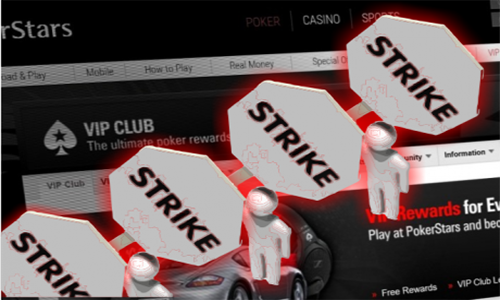Did the PokerStars Boycott Actually Do Anything?
So the PokerStars boycott was a real thing that happened. Somewhere in the range of 2,500 players, many of them high stakes players, made it a point to not play at PokerStars last Tuesday, Wednesday, and Thursday in protest of the recently announced changes to the site’s VIP program, most of which set to be implemented January 1st, 2016. Now that the sit-out as come and gone, the question remains: Did it have an impact?
The answer is foggy. It may have, but it is hard to tell. Looking at PokerScout’s cash game traffic numbers, PokerStars’ traffic peaked at 24,544 players on Monday, the day before the boycott began. On Tuesday, the first day of the boycott, peak traffic skyrocketed 54 percent to 37,758. Compared to the same day a week before, it was an even bigger jump: 65 percent from 22,939.
So the boycott failed miserably that first day, right? No, not really. December 1st was the first day of the Christmas Calendar phase of the PokerStars Christmas Festival promotion. In that promotion, PokerStars unveils a new promo each day, like a poker advent calendar. On Tuesday, that just happened to be a Milestone Hand promo, which always attracts thousands of players. In Milestone Hand promos, certain numbered hands (often every millionth hand starting at some point, for instance) will award cash prizes to the players involved in the hand as well as prizes to those playing at the same types of tables as the one where the Milestone Hand hit. Thus, during these promotions, poker players flood the site, hoping to get lucky. This is why traffic was up so sharply on Tuesday. Not even a boycott could stop it.
Of course, for all we know, peak traffic could have been up even more without the boycott. It’s just hard to tell. PokerScout does have one statistic that may be a bit more telling, though. When compared with the average of the previous three Tuesdays, peak traffic in just the high-stakes cash games was down 29 percent on December 1st. This is the equivalent of about 90 players, so it does appear that the boycott had some effect. The trend in the high-stakes games continued throughout the boycott.
Now, one could play devil’s advocate and say that if 2,500 players really did sit out, the drop in high-stakes players should have been greater. Even if only a tenth of the boycotters were high-stakes, that’s still 250 people. In addition, PokerScout counts all instances of a player at the tables, so if someone is playing at eight tables – and high-stakes players tend to multi-table – that player is counted eight times.
Again, hard to tell.
The other two days of the boycott did not show the dramatic change in numbers that Tuesday did because the Milestone Hands promo was over. Peak cash-game traffic on Wednesday was 25,847, a 12 percent increase from the previous Wednesday, while peak traffic on Thursday was 25,040, a 9 percent increase from the same period the week before.
On the tournament side, most were not noticeably affected by the boycott. The one exception to this, though, is a spot where one might have expected there to be an impact: the $1,050 buy-in Super Tuesday tourney. Just 451 players registered for that tournament, barely allowing it to hit the $450,000 guaranteed prize pool without an overlay. The week prior, that tournament garnered 516 players. It could be just a coincidence, but this is most likely an example of the boycott making an impact, as the tournament quite clearly targets high stakes players.
The question still remains, though, if PokerStars will even care. High-stakes players make up such a small portion of the customer base (though of course they rake much more, on average, than a low-stakes player) that even if the numbers show that a sit-out is effective, PokerStars might not do anything. The company clearly wants to shift to a recreational, player-based model, so if that comes at the expense of high-volume, high-stakes players, the attitude might just be, “So be it.”
As has been reported, high-stakes players have been outraged by the upcoming VIP program changes because they hit those players hard. Of particular note are the elimination of the Supernova Elite status tier on January 1st, 2017, a cap on player rewards, the removal of VPP’s from high-stakes cash games, and the conversion of FPP’s to StarsCoins (PokerStars’ new loyalty unit) at an exchange rate lower than FPP’s are worth. Not everyone begrudges PokerStars’ right to change its VIP system, but most feel that some of the changes represent broken promises to high-level players who have been working hard towards achieving certain VIP goals, only to have rewards stripped mid-stream.

















COMMENTS